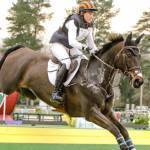Choose Natural Vitamin E for Exercising Horses

What if you could provide your performance horse with a single supplement that would decrease oxidative stress and free radical damage as well as regulate inflammation?
According to nutrition researchers, vitamin E can do all of this, though the type and amount of vitamin E used remains critical.*
“Supplemental vitamin E comes in one of two forms—natural or synthetic. In this latest research and previous studies, the natural form of vitamin E appears to be a superior product,” said Kathleen Crandell, Ph.D., a nutritionist for Kentucky Equine Research.
In a new study, horses were offered either natural or synthetic vitamin E at doses ranging from 1,000 to 4,000 IU. After six weeks, all horses underwent a training program and two standard exercises tests (SETs) to measure oxidative stress, cytokine levels, and muscle damage and to ascertain which form of vitamin E helps regulate these values more. Cytokines are minute proteins especially valuable during inflammatory and immune challenges.
Horses supplemented with natural vitamin E had higher levels of vitamin E in circulation, less oxidative stress, and lower values of proinflammatory cytokines than those offered synthetic vitamin E. Further, muscle damage was also lower in animals that received natural vitamin E.
The researchers concluded that “feeding higher levels of the more bioactive natural vitamin E could have beneficial effects for the equine athlete.”
This study reinforces previous research performed on vitamin E sources, including that done by Kentucky Equine Research.
“Nano-E is a powerful, natural-source, water-soluble liquid vitamin E antioxidant supplement for horses available as a unique, rapidly bioavailable nanoparticles. This product is top-dressed on feed and labeled for doses ranging from 1,000-5,000 IU per 1,100-lb (500-kg) horse 6-12 hours prior to competition or stressful event,” shared Crandell.
*Fagan, M.M., A. Adams, P. Harris, et al. 2019. Cytokine and oxidative stress response to vitamin E supplementation in exercising horses. Journal of Equine Veterinary Science. 76:48-49.








